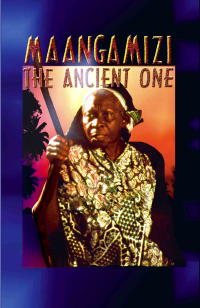
Tanzania, officially the United Republic of Tanzania, is a country in East Africa within the African Great Lakes region. It borders Uganda to the north; Kenya to the northeast; the Indian Ocean to the east; Mozambique and Malawi to the south; Zambia to the southwest; and Rwanda, Burundi, and the Democratic Republic of the Congo to the west. Mount Kilimanjaro, Africa's highest mountain, is in northeastern Tanzania. According to 2022 national census, Tanzania has a population of nearly 62 million, making it the fifth largest in Africa.

This article is about the demographic features of the population of Tanzania, including population density, ethnicity, education level, health of the populace, economic status, religious affiliations, and other aspects of the population.

Zanzibar is an insular semi-autonomous province which united with Tanganyika in 1964 to form the United Republic of Tanzania. It is an archipelago in the Indian Ocean, 25–50 km (16–31 mi) off the coast of the mainland, and consists of many small islands and two large ones: Unguja and Pemba Island. The capital is Zanzibar City, located on the island of Unguja. Its historic centre, Stone Town, is a World Heritage Site.

East Africa, Eastern Africa, or East of Africa, is the eastern subregion of the African continent. In the United Nations Statistics Division scheme of geographic regions, 10-11-(16*) territories make up Eastern Africa:
An unclassified language is a language whose genetic affiliation to other languages has not been established. Languages can be unclassified for a variety of reasons, mostly due to a lack of reliable data but sometimes due to the confounding influence of language contact, if different layers of its vocabulary or morphology point in different directions and it is not clear which represents the ancestral form of the language. Some poorly known extinct languages, such as Gutian and Cacán, are simply unclassifiable, and it is unlikely the situation will ever change.
The Suba of Tanzania are a community of people in Rorya District, Mara Region, Tanzania speaking mutually intelligible varieties of the Suba language. They are mainly located in Nyancha, Luo-Imbo and Suba Divisions of Rorya District. The groups commonly listed as being part of the Suba community are the Hacha, Kine, Rieri, Simbiti, Surwa and Sweta. There are a total of around 80,000 ethnic Suba living in Tanzania, most of whom are still speaking the Suba language although some, particularly the Rieri, have started to speak Luo.
Mwanga, or Namwanga (Nyamwanga), is a Bantu language spoken by the Mwanga people in the Northern Province of Zambia and in Mbeya Region, Tanzania. The 2010 Zambian census found 140,000 speakers. The current number in Tanzania is unknown; Ethnologue cites a figure from 1987 of 87,000.

The Ndali are a Bantu ethnolinguistic group native to Momba District in Songwe Region, Tanzania and northern Malawi. In 1987 the Ndali population of Tanzania was estimated to number 150,000, and in 2003 the population in Malawi was estimated at 70,000, for a total for the group of about 220,000. Their language is related to many Bantu languages, for example Nyakyusa.
Tetela, also Sungu, is a Bantu language of northern Kasai-Oriental Province, Democratic Republic of the Congo. It is spoken by the Tetela people.

Maangamizi: The Ancient One is a 2001 American / Tanzanian drama film directed by Martin Mhando and Ron Mulvihill and executive produced by Jonathan Demme. It premiered at the Pan African Film Festival and has played in over 55 Film Festivals worldwide. It was the Tanzanian submission for the Academy Award for Best foreign language film, the first, and as of 2021, only, film to be submitted from that country, but was not nominated.

Șura Mare is a commune located in Sibiu County, Transylvania, Romania. It is composed of two villages, Hamba and Șura Mare. Șura Mare was first mentioned in 1332, and Hamba in 1337.
Makonde, or Kimakonde, is the language spoken by the Makonde, an ethnic group in southeast Tanzania and northern Mozambique. Makonde is a central Bantu language closely related to Yao. The Matambwe (Matembwe) and Mabiha (Maviha) dialects are divergent, and may not be Makonde.
Mbugwe or Mbuwe (Kimbugwe) is a Bantu language of spoken by the Mbugwe people of Lake Manyara in the Manyara Region of Central Tanzania. Mbugwe is estimated to be spoken by some 34,000 people.
Amba is a language spoken in parts of Uganda and the Democratic Republic of Congo by the Amba people. The Amba people call it Kwamba and it is known as Kihumu in the Democratic Republic of the Congo. Amba has a 70% lexical similarity with Bera. Dialects include Kyanzi (Kihyanzi) and Suwa (Kusuwa).
The Zigula or Zigua language, Chizigua, is a Bantu language of Tanzania and Somalia, where the Mushunguli dialect is spoken.
Zaramo is a Niger-Congo language, formerly primary language of the Zaramo people of eastern Tanzania. Zaramo is also known as Zalamo, Kizaramo, Dzalamo, Zaramu, Saramo and, Myagatwa. The language is critically endangered. The ethnic population of the Zaramo people reaches about 200,000, yet there are only a few elderly speakers remaining.
Nyiha is a Bantu language primarily spoken in Tanzania and Zambia. The language of the 10,000 speakers in Malawi is different enough to sometimes be considered a distinct language.

Ali Bach Hamba was a Tunisian lawyer, journalist and politician. He co-founded the Young Tunisians with Béchir Sfar in 1907.
Wanda is a Bantu language of Tanzania. It is considered a vulnerable language with less than 43,000 native speakers worldwide. At least half of Wanda people speak limited Swahili, one of the official languages of Tanzania. Speakers are particularly concentrated in Kamsamba ward in Momba District Council and Kipeta ward in Sumbawanga District.
Ngurimi (Ngoreme) is a Bantu language of Tanzania. Ngoreme is spoken in the Serengeti District of the Mara Region of north-west Tanzania by some 55,000 people. There are two main dialects of Ngoreme - a northern dialect and a southern dialect - which maintain mutual intelligibility.







